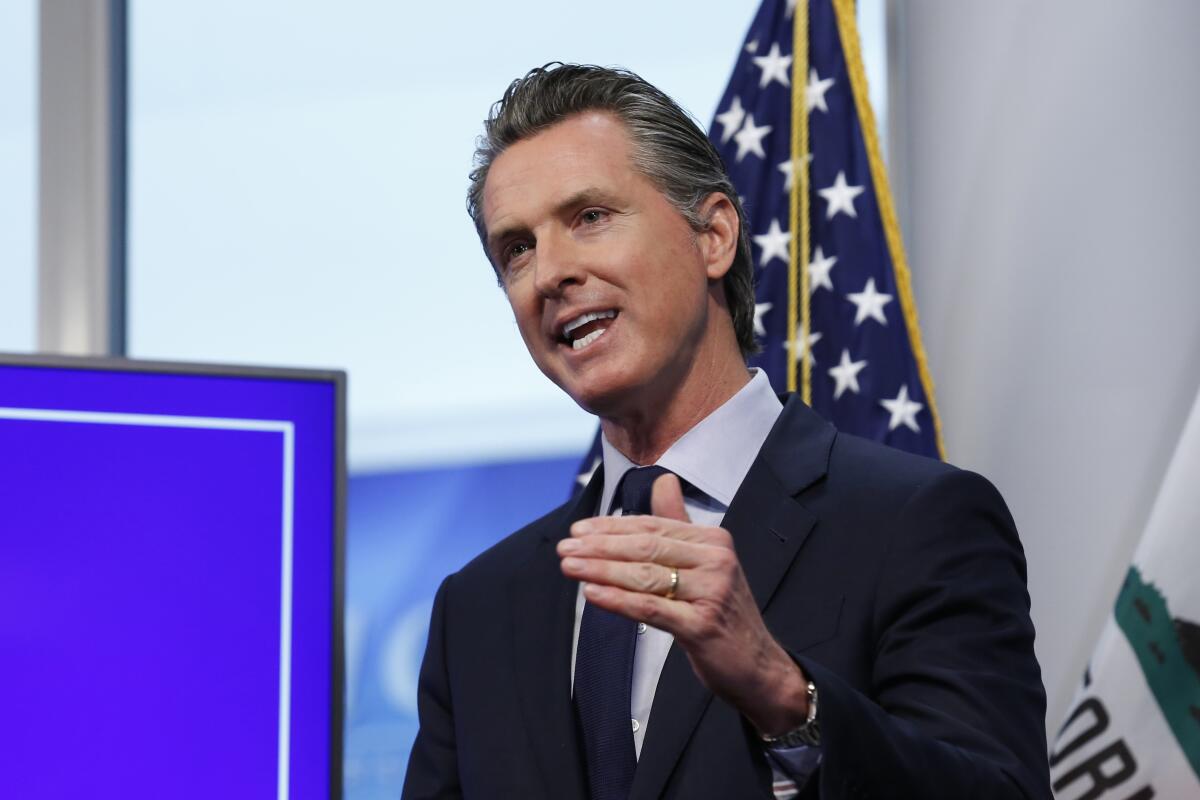Newsom is relying on public health officials for his coronavirus response. But he has to listen to others too

- Share via
SACRAMENTO — Lots of people have specific roles in life. In our American democracy, no single sector can rule absolutely — not even public health officials in a pandemic.
Public health professionals have one compelling goal right now: Vanquish the coronavirus. And do whatever it takes to achieve that end.
We’re fortunate they’re here and so dedicated. They should be the most influential advisors listened to by all elected chief executives — the president, governors and mayors. And by all indications they are, except it seems for President Trump.
But regardless of their wisdom about virus contagion, health experts cannot be given a free hand in dictating public policy. They have only one professional agenda. People collectively have many.
Gov. Gavin Newsom is very much aware of that real-life truth.
“If we followed public health officials, California wouldn’t open back up to anything this year,” says a Newsom insider, who didn’t want to be identified. “This is a balancing act. Public health isn’t absolute.
“Part of living life is having a livelihood. He gets that.”
Newsom also gets this, as he mentioned in his daily coronavirus briefing Wednesday: “People’s mental health has to be considered.”
For many people, their mental health deteriorates after being cooped up at home for a long period. And it’s even worse for workers who have been laid off because their employer’s business has collapsed during the pandemic.
Governors also must listen to business, whose sole reason for existence is profit. If profitable, business provides jobs and tax revenue to pay for the government safety net programs that Democrats demand, plus schooling for everyone’s kids and grandkids.
Democratic politicians must listen to organized labor — their campaign patrons — whose sole goal is well-compensated jobs.
And most important, there’s the citizenry — the electorate. Ultimately, voters are the boss. And anyone who thinks that’s naive should read up on former Gov. Gray Davis. Also, former Presidents George H.W. Bush and Jimmy Carter. All three were ousted from office by unhappy voters in the last 40 years.
It’s often damned if they do, damned if they don’t for elected officials.
In a republican system of democracy, candidates for office get elected to represent the people in decision making. That’s called politics.
What I’ve never quite understood is why politicians then seem to be ashamed of being swayed by voters or interests in making tough decisions. They won’t admit to acting based on what they consider to be good politics — doing what their constituents want.
On the flip side, if they don’t heed their voters’ wishes, they get slammed for not obeying the public’s will — as Newsom did shortly after taking office when he ordered a moratorium on capital punishment. Voters had twice declared in recent statewide elections that they wanted to execute the most brutal murderers — even expedite it.
Newsom has been fortunate in his battle against the virus. His leadership has enjoyed overwhelming public support so far.
In a mid-April poll by the UC Berkeley Institute of Governmental Studies, a phenomenally high 70% of voters approved of how Newsom was handling his job — up 10 percentage points from September.
Part of the reason for that high mark surely was because they agreed with the governor’s anti-virus actions. Seventy percent of voters were more worried that his stay-at-home orders would end too soon, causing the virus to spread, than they were that the confinements would linger too long, further damaging the economy.
That was mid-April, however. There have been growing protests against Newsom’s stay-at-home order in rural areas where the virus has had little if any impact. Some counties have defied Newsom by reopening on their own. Their public health officials have planned it.
But although Newsom said Tuesday those counties were “making a big mistake … putting their public at risk,” he pragmatically acknowledged there are “regional differences” throughout California and said some rural communities would be allowed to open up faster than others.
He also approved the partial reopening of some businesses throughout the state.
Two weeks ago, he wisely backed off his plan to close all beaches in California after his intention was leaked and protests erupted overnight. One big reason he pulled back was that most communities agreed to negotiate with him over terms for remaining open.
Only Orange County cities refused, and their beaches were ordered temporarily closed. When they came to the bargaining table and worked out a plan with the governor, he reopened the beaches Monday.
“He’s going to follow science,” the Newsom insider told me. “But there’s lots of wiggle room.”
A governor has tremendous power after he declares a statewide emergency. But any edicts require local cooperation to enforce his orders and provide medical care.
“We have a democratic system of government based on the consent of the governed,” says Democratic consultant Garry South, former chief strategist for Davis. “If the governed start withdrawing their consent, you have a problem.
“I think Newsom has handled it skillfully.”
Bob Shrum, director of the Center for the Political Future at USC, says, “The folks conducting protests are a noisy minority….
“If I were running the government, I would listen to scientists and health directors.”
Newsom is. But as an elected politician, he also knows it’s wise to listen to everyone.
More to Read
Sign up for Essential California
The most important California stories and recommendations in your inbox every morning.
You may occasionally receive promotional content from the Los Angeles Times.














